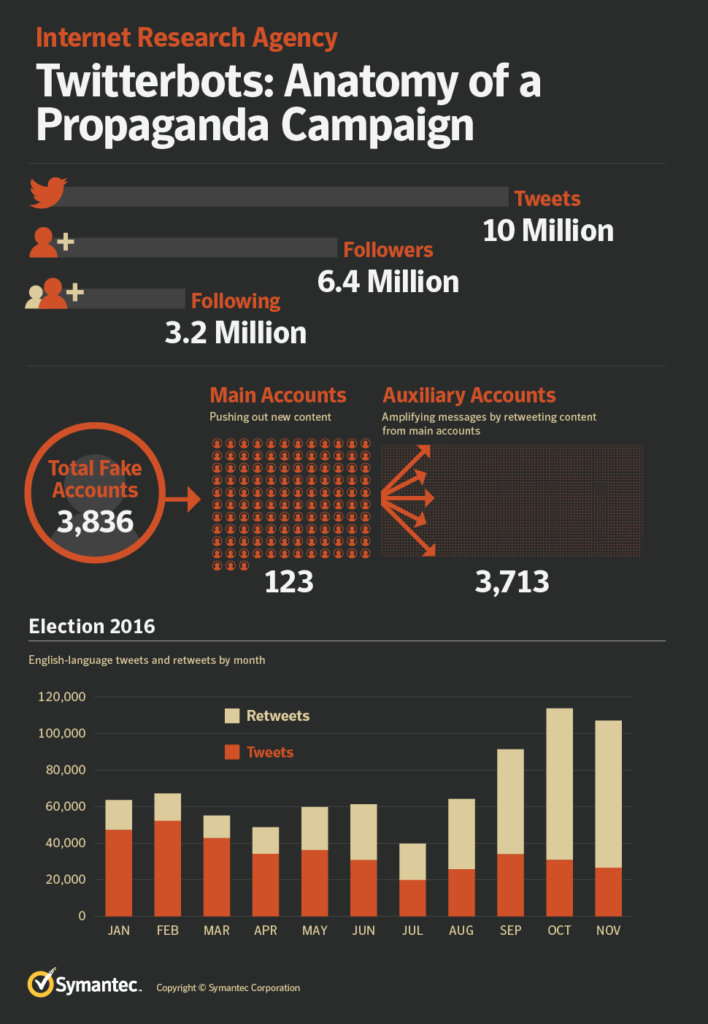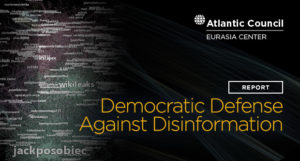
Credit: Symantec
Russia’s infamous troll farm conducted a campaign on Twitter before the 2016 elections that was larger, more coordinated and more effective than previously known, research from cybersecurity firm Symantec out Wednesday concluded, POLITICO reports:
The Internet Research Agency campaign may not only have had more sway — reaching large numbers of real users — than previously thought, it also demonstrated ample patience and might have generated income for some of the phony accounts, Symantec found.
Their research – Twitterbots: Anatomy of a Propaganda Campaign – analyzed a massive data set that Twitter released in October 2018 on nearly 3,900 suspended accounts and 10 million tweets. It discovered that the average lag between account creation and first tweet was 177 days and the most retweeted account garnered 6 million retweets, and less than 2,000 of those came from within the IRA-linked network of accounts.
 “Our response to bad content on social media is generally to say it should be taken down. That’s because that’s something we as politicians who are not technical experts understand,” said Rep. Tom Malinowski (D-N.J.), former assistant secretary of State for Democracy, Human Rights and Labor. “What we’ve had a harder time grasping is the virality machine that’s built into the social networks through the algorithms that determine what news we see on a daily basis,” he said.
“Our response to bad content on social media is generally to say it should be taken down. That’s because that’s something we as politicians who are not technical experts understand,” said Rep. Tom Malinowski (D-N.J.), former assistant secretary of State for Democracy, Human Rights and Labor. “What we’ve had a harder time grasping is the virality machine that’s built into the social networks through the algorithms that determine what news we see on a daily basis,” he said.
Foreign interference in democratic elections has put disinformation at the forefront of policy in Europe and the United States, the Atlantic Council reports. The second edition of Democratic Defense Against Disinformation takes stock of how governments, multinational institutions, civil-society groups, and the private sector have responded to the disinformation challenge. As democracies have responded, our adversaries have adapted and evolved. As the speed and efficiency of influence operations increase, democratic societies need to further invest in resilience and resistance to win the new information war. Democratic Defense Against Disinformation 2.0 is a report card on efforts and a road-map for policymakers and social media companies.
The report authors, Dr. Alina Polyakova, director, of the Project on Global Democracy and Emerging Technologies at the Brookings Institution and Ambassador Daniel Fried, distinguished fellow with the Atlantic Council (and National Endowment for Democracy board member), will present the main finding and a way forward.
Keynote Remarks: The Hon. Chris Murphy, US Senator for Connecticut, US Senate.
Please join the Atlantic Council for the launch of Democratic Defense Against Disinformation 2.0 on Thursday, June 13, 2019 from 2:30 p.m. to 4:00 p.m. at the Russell Senate Office Building Room 485 (2 Constitution Ave NE, Room 485, Washington, DC 20002). RSVP







